26th Carnival of Nuclear Energy Bloggers
Special edition for ANS Winter Meeting
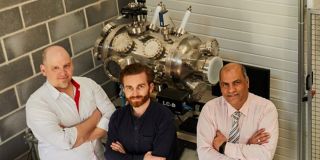
A message from Chapman Nuclear
New Lattice Confinement Fusion Power Reactors May Eliminate 95% of SNF
Special edition for ANS Winter Meeting
Getting the government to give up its uranium enrichment program is the key issue
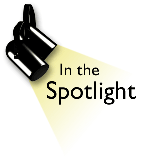 This year's North American - Young Generation in Nuclear (NA-YGN) continental conference was held in May and was themed "Leading the Change: Go Green." Participants learned that the future of electricity production in the United States would be heavily influenced by the desire to combat global warming. This desire is starting a national debate on how the country should select technologies for new electricity production facilities.
This year's North American - Young Generation in Nuclear (NA-YGN) continental conference was held in May and was themed "Leading the Change: Go Green." Participants learned that the future of electricity production in the United States would be heavily influenced by the desire to combat global warming. This desire is starting a national debate on how the country should select technologies for new electricity production facilities.
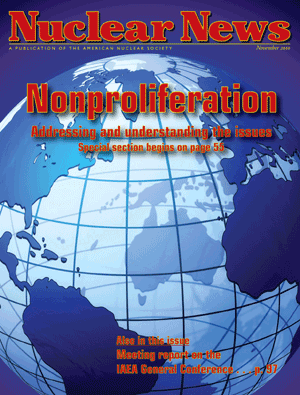 The November issue of Nuclear News will soon be available electronically to ANS members. The issue contains a special section on nuclear nonproliferation, featuring the following articles:
The November issue of Nuclear News will soon be available electronically to ANS members. The issue contains a special section on nuclear nonproliferation, featuring the following articles:
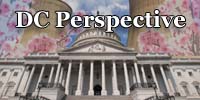 A friend wrote me a nice note the other day that has brightened my outlook on the future of nuclear energy in the United States. Like many people who write about both the industry and the technology, I have been focusing on the complex story of nuclear loan guarantees. As an Annapolis, Md., resident and DC area worker, it was difficult to escape the frequently negative news coverage of the troubled Calvert Cliffs unit 3 project.
A friend wrote me a nice note the other day that has brightened my outlook on the future of nuclear energy in the United States. Like many people who write about both the industry and the technology, I have been focusing on the complex story of nuclear loan guarantees. As an Annapolis, Md., resident and DC area worker, it was difficult to escape the frequently negative news coverage of the troubled Calvert Cliffs unit 3 project.
 The 25th Carnival of Nuclear Energy Blogs is up at Yes Vermont Yankee. It features blog posts from the leading U.S. nuclear bloggers. It is a roundup of featured content from the nation's leading pro-nuclear blogs. If you want to hear the voice of the nuclear renaissance, this is where you will find it.
The 25th Carnival of Nuclear Energy Blogs is up at Yes Vermont Yankee. It features blog posts from the leading U.S. nuclear bloggers. It is a roundup of featured content from the nation's leading pro-nuclear blogs. If you want to hear the voice of the nuclear renaissance, this is where you will find it.
 The 21st Carnival of Green Business blogs is up at sustainablog! Since July 2003, sustainablog has been providing information on environmental and economic sustainability, green and sustainable business, and environmental politics. The Carnival of Green Business Blogs is a roundup of featured content highlighting news, opinions, and insights on issues of interest to the green business community.
The 21st Carnival of Green Business blogs is up at sustainablog! Since July 2003, sustainablog has been providing information on environmental and economic sustainability, green and sustainable business, and environmental politics. The Carnival of Green Business Blogs is a roundup of featured content highlighting news, opinions, and insights on issues of interest to the green business community.
Infocast held a gabfest for small nuclear proponents last week, promising an opportunity for small modular reactor (SMR) vendors and suppliers to understand how the future of their industry would be shaped by banks and venture capital firms. It's high time that the SMR bandwagon includes the financiers who'll really drive the business.
 On September 17, the Purdue University American Nuclear Society Student Section (Purdue ANS) participated in the 2nd Annual Lugar Collegiate Energy Summit at the Indianapolis Museum of Art. Fifteen Purdue ANS members were among the 200 participants at this informative summit focused on the energy challenges facing the nation and energy security. Students attended workshops to learn how to run successful community programs about energy issues. Sen. Richard Lugar (R.,Ind.) gave a speech on energy options, and Purdue ANS members challenged him with questions about nuclear energy options.
On September 17, the Purdue University American Nuclear Society Student Section (Purdue ANS) participated in the 2nd Annual Lugar Collegiate Energy Summit at the Indianapolis Museum of Art. Fifteen Purdue ANS members were among the 200 participants at this informative summit focused on the energy challenges facing the nation and energy security. Students attended workshops to learn how to run successful community programs about energy issues. Sen. Richard Lugar (R.,Ind.) gave a speech on energy options, and Purdue ANS members challenged him with questions about nuclear energy options.
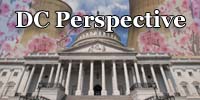 Over the next 25 years, the demand for electricity in the United States is expected to rise by 30 percent. This is a trend that will almost certainly accelerate as we move increasingly toward an electricity-based transportation infrastructure and plug-in hybrids and we replace fossil fuels. In fact, as the lead Republican sponsor of the Electric Drive Vehicle Deployment Act of 2010, I'm pushing for exactly that. This bipartisan bill will invest in the development, installation, and deployment of advanced electric vehicle infrastructure, and help put more electric vehicles on the roads.
Over the next 25 years, the demand for electricity in the United States is expected to rise by 30 percent. This is a trend that will almost certainly accelerate as we move increasingly toward an electricity-based transportation infrastructure and plug-in hybrids and we replace fossil fuels. In fact, as the lead Republican sponsor of the Electric Drive Vehicle Deployment Act of 2010, I'm pushing for exactly that. This bipartisan bill will invest in the development, installation, and deployment of advanced electric vehicle infrastructure, and help put more electric vehicles on the roads.
 The 24th Carnival of Nuclear Energy Blogs is up at Idaho Samizdat. It features blog posts from the leading U.S. nuclear bloggers. It is a roundup of featured content from the nation's leading pro-nuclear blogs. If you want to hear the voice of the nuclear renaissance, this is where you will find it.
The 24th Carnival of Nuclear Energy Blogs is up at Idaho Samizdat. It features blog posts from the leading U.S. nuclear bloggers. It is a roundup of featured content from the nation's leading pro-nuclear blogs. If you want to hear the voice of the nuclear renaissance, this is where you will find it.
The 20th Carnival of Green Business blogs is up at Triple Pundit! It is a roundup of featured content from the nation's green business blogs. This week's Green Business Blog Carnival includes the ANS Nuclear Cafe entry on Nuclear and the Renewable Energy Standard.
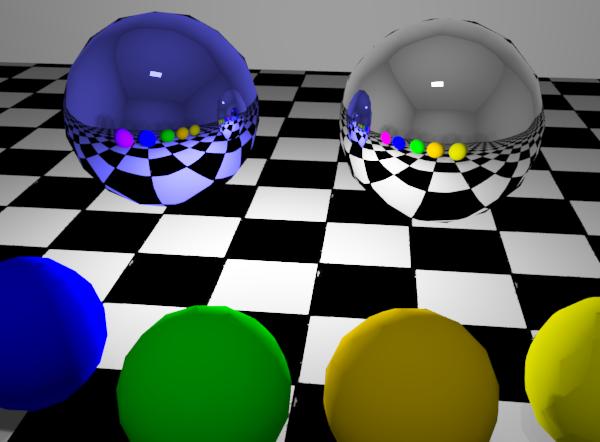 In July 2010 a software worm, which is malevolent computer code, appeared on the radar screen of cyber security firms when it was found to be targeting computers in Iran and several other countries running industrial control systems.
In July 2010 a software worm, which is malevolent computer code, appeared on the radar screen of cyber security firms when it was found to be targeting computers in Iran and several other countries running industrial control systems.
 Fall is in the air! The temperatures are cool-the leaves are turning-and (after a childhood filled with repeated disappointment and utter futility) I get to watch my Philadelphia Phillies make their mark on another MLB post-season.
Fall is in the air! The temperatures are cool-the leaves are turning-and (after a childhood filled with repeated disappointment and utter futility) I get to watch my Philadelphia Phillies make their mark on another MLB post-season.
The American Nuclear Society (ANS) will be participating on Saturday and Sunday, October 23-24, at the grand finale Expo of the USA Science & Engineering Festival, to be held on the National Mall, in Washington, D.C.
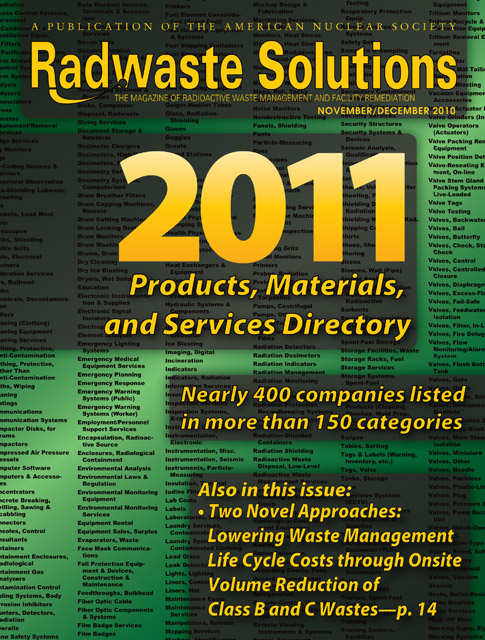 The November/December issue of Radwaste Solutions will soon be available electronically to ANS members. This issue includes the fifth annual Buyers Guide, which is a directory of companies that provide products or services that relate directly to work at Department of Energy cleanup and remediation sites and civilian decommissioning projects, as well as to radioactive waste management in both the utility and specialized nonpower/nongovernment segments of the nuclear industry. This year's Buyers Guide includes information on nearly 400 companies listed in more than 150 categories.
The November/December issue of Radwaste Solutions will soon be available electronically to ANS members. This issue includes the fifth annual Buyers Guide, which is a directory of companies that provide products or services that relate directly to work at Department of Energy cleanup and remediation sites and civilian decommissioning projects, as well as to radioactive waste management in both the utility and specialized nonpower/nongovernment segments of the nuclear industry. This year's Buyers Guide includes information on nearly 400 companies listed in more than 150 categories.
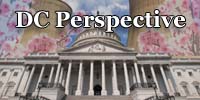 Now that more comprehensive climate change policies such as cap-and-trade are on indefinite hold, the U.S. Congress is considering a national Renewable Energy Standard (RES) in an effort to do something on energy issues. The RES would require that 15 percent of all U.S. electrical generation be provided by "renewable" sources by 2020. Currently, the definition of "renewable energy" does not include nuclear. Similar policies are already in place in many states, such as California.
Now that more comprehensive climate change policies such as cap-and-trade are on indefinite hold, the U.S. Congress is considering a national Renewable Energy Standard (RES) in an effort to do something on energy issues. The RES would require that 15 percent of all U.S. electrical generation be provided by "renewable" sources by 2020. Currently, the definition of "renewable energy" does not include nuclear. Similar policies are already in place in many states, such as California.